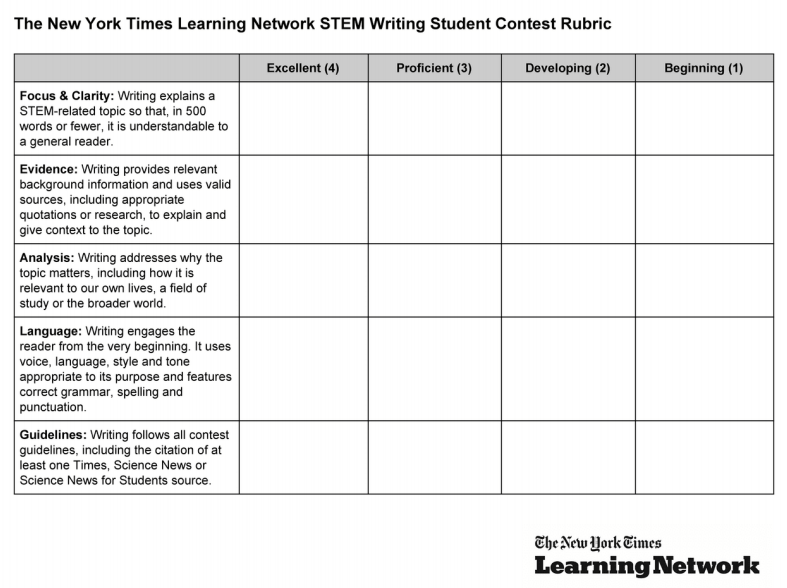- 翰林提供学术活动、国际课程、科研项目一站式留学背景提升服务!
- 400 888 0080
纽约时报STEM写作竞赛新赛季开启,用500字阐述你的议题
纽约时报STEM写作学术活动(New York Times STEM Writing Contest)是纽约时报举办的一系列学生写作学术活动之一。比赛要求学生找到一个感兴趣的与STEM(理科、数学、工科、科学等科目)相关的问题、概念或议题,用500字或更少的字数,向读者解释你的理解,让我们明白为什么它很重要。
纽约时报系列比赛是全球写作学术活动中最受关注、含金量最高的比赛之一,你可以借助性影响力的《纽约时报》平台,为全世界的读者发表专题写作,分享你的真知灼见,影响全球同龄人,同时,参与其中将对你的英语写作水平及申请名校的学术背景有极大提升助力。
适合对象
全球11-19岁初高中学生,对STEM相关及科普写作教育的学生们均可参加。
美国和英国13至19岁的学生,以及世界其他地方16至19岁的学生,可以自己提交参赛作品。
年龄较小的学生必须由老师或者家长代为提交。
赛事时间
2022年2月2日——3月9日(近期为最佳备赛时间)
参赛作品要求
文章不得超过500字,不包括标题。
文章需为独立原创作品,不得在其他地方投稿或发表过。
文章需为英文,注意写作用词文明。
每位学生仅可提交一份参赛作品。
文章需要包括三个要素:
1.能够引起观众的注意,我们感兴趣的主题;
2.有引用或对主题的诊断的研究,以提供背景信息和专家可信度;
3. 详细说明你为什么认为该主题很重要,人们会关心这个主题,它会影响谁或影响什么,为什么以及如何影响,它与该领域的更广泛问题,当今世界以及我们自己的生活有什么关系。
评审标准

成果奖项
Winners
Runners-Up
Honorable Mentions
入围者的作品将在作者本人同意后,被发表在纽约时报学习网上 。
结果将于比赛结束后四到六周左右的时间发布。最终入围者将收到邮件通知。
往届优秀作品
Sleep to Clean: A Prevention of Plaques That Lead to Alzheimer’s Disease
Our brain’s storage is like a teenager’s room — messy, cluttered and a fortress of personal memories. Scattered around are beloved belongings, such as your family heirloom or favorite cat, but imagine if suddenly these treasures disappeared, with only dust bunnies lying in their wake. Poof. Gone.
Despite seeming like deceptive magic, this is the blunt reality of an individual’s brain with Alzheimer’s, a daunting and currently incurable disease. With about 10 percent of people over the age of 65 diagnosed, it seems inevitable that it would affect individuals and families. But, what if this disease could be prevented through something simple — sufficient sleep?
Take a look inside the structure of a healthy brain. As they are created and destroyed, billions of neurons reside and correspond with each other through synapses. As new experiences feed into our brain every second, the synapses receive neurotransmitters that are responsible for the communication in our brain: seeing, thinking, remembering. However, in the brain of an Alzheimer’s patient, harmful proteins called amyloid-beta 42 block these synapses. Naturally produced by neurons, amyloid-beta proteins accumulate and lead to Alzheimer’s if not cleaned out fast enough by microglia cells, the cleaners for the brain. Over time, the rapid rate of amyloid-beta production causes the proteins to clump up into plaque. This unsettling change results in brain dysfunction; proteins like tau create neurofibrillary tangles that choke off the insides of neurons. Now, the once messy room is structurally and functionally destroyed by a hurricane. Looking to rapidly fix the chaos, microglia cells secrete inflammatory factors, resulting in prolonged inflammation and even the destruction of neurons.
In the past years, scientists began noticing a relationship between Alzheimer’s disease and sleep. Dr. Yo-El Ju evaluated patients in sleep apnea treatment. Following their successful treatment, she found that both the production and number of beta-amyloids had decreased. Laura Lewis, an assistant professor from Boston University who conducted a study on brain waves and sleep, said that the patients seemed “to have a change in their ability to clear proteins or waste products from their brain.” Hence, sleep has a vital role in the reduction of beta-amyloid plaques — the emerging signs of oncoming Alzheimer’s.
But, how come? In a separate study done by Dr. Maiken Nedergaard, it was discovered that the brain cleans waste two times faster when asleep. “So things like amyloid-beta, which are implicated in Alzheimer’s disease, seem to actually be removed more rapidly from the brain,” Dr. Lewis pointed out. Allowing microglia cells and other proteins to actively sweep out waste at much faster rates, sleep reshapes the untidy room in the brain, solidifying memories. With a healthy sleep routine, the fate of our brains could be deterred from Alzheimer’s disease.
There is still much to discover. As Dr. Lewis said, “I don’t know whether it’s that sleep increases clearance or whether sleep decreases the production of waste products.” Every step in the understanding of neurology can help uncover new preventions for Alzheimer’s, improving brain health for generations to come.
近期热门国际学术活动
01美国生物奥林匹克 USABO
02纽约时报秋季评论大赛
03全美经济学挑战赛 NEC
04英国物理奥林匹克学术活动 BPhO
05国际脑科学大赛 BrainBee
06全球女性科创赛 Technovation
07美国高中生传媒大赛
08美国计算机奥林匹克 USACO
09青年影响力大赛 YIC
10北美计算语言学 NACLO
更多赛事信息及参赛经验分享
请扫码添加翰林顾问老师详细咨询
还有不定期的高能讲座等你来参加!

最新发布
© 2026. All Rights Reserved. 沪ICP备2023009024号-1









